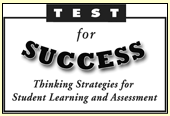Test for Success
Thinking Strategies for Student Learning and Assessment
 | ||
Type: | Test Preparation | |
Purpose: | To help students improve their test taking skills | |
Copyright: | 1999 | |
Grades: | K-8 | |
Time: | 30-45 minutes | |
Scoring: | Hand and local scoring | |
Product Details – Content
Test for Success builds student confidence as it familiarizes students with a variety of question formats found on standardized tests. The instructional emphasis in Test for Success is on fundamental test-taking strategies and important academic skills. The four levels, A through D, teach students proven strategies for approaching any test content, rather than drilling content and exercise for a specific test. The program presents strategies for test taking, clear and concise instructional lessons, and provides appropriate and ethical preparation for taking any test.
Teacher’s Guides help teachers prepare lessons and focus their instruction. A lesson-based transparency set – customized to each level – provides meaningful support to classroom instruction. Level A is designed to familiarize younger students with standardized testing prior to their first encounter with a standardized test. Level A is organized into five 30- to 45-minute orally administered lessons – Listening Carefully and Making the Best Choices, Looking at Words, Choosing the Best Words, Using Clues, and A Closer Look at Numbers.
Levels B, C, and D move students to progressively more sophisticated test formats while they practice varied test-taking strategies. The ten lessons of Levels B, C, and D – which take approximately 35 to 45 minutes – are organized into four major units: Mechanics of Test Taking, Reading Strategies, Language Strategies, and Mathematics Strategies.
Levels | Grades | Number of Lessons |
A | K-2 | 5 |
B | 3-4 | 10 |
C | 5-6 | 10 |
D | 7-8 | 10 |
Each level includes test-taking strategies, such as pacing, using clues, and making the best choices among possible answers. Each level also covers important content-area thinking strategies to help students use effective reasoning and problem solving skills. Content-area lessons include drawing conclusions, ordering ideas, developing paragraphs, solving problems, and interpreting data.
Level A
Level B
Level C
Level D


